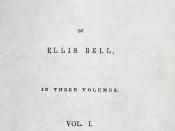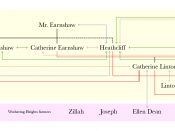once upon a time, it seems, an English clergyman born Brunty or Branty, self-baptized the more romantic Bronte, brought home to his four children a box of twelve wooden soldiers. The children lived in isolation in a parsonage high on the Yorkshire moors, which is to say, at the edge of the world; each was possessed of an extraordinarily fecund imagination; the wooden soldiers soon acquired life and identities (among them the Duke of Wellington and Bonaparte). The way by which a masterpiece as unanticipated as Wuthering Heights comes to be written, involving, as it did, the gradual evolution from such early childish games to more complex games of written language (serial stories transcribed by the children in minute italic handwriting meant to resemble print; secret plays, or "bed plays," written at bedtime; the transcribing of the ambitious Gondal and Angria sagas, which were to be viable for nearly fifteen years) is so compelling a tale, so irresistible a legend, one is tempted to see in it a miniature history of the imagination's triumph, in the most socially restricted of environments.
No poet or novelist would wish to reduce his mature works to the status of mere games, or even to acknowledge an explicit kinship with the prodigies of the child's dreaming mind; but it is clear that the play of the imagination has much to do with childish origins, and may, in truth, be inseparable from it. As Henry James has observed, in a somewhat peevish aside regarding the "romantic tradition" and the "public ecstasies" surrounding the Bronte sisters, "Literature is an objective, a projected result; it is life that is the unconscious, the agitated, the struggling, floundering cause." Certainly this is true, but its dogma is too blunt, too assured, to inspire absolute confidence. The unconscious energies feed...


